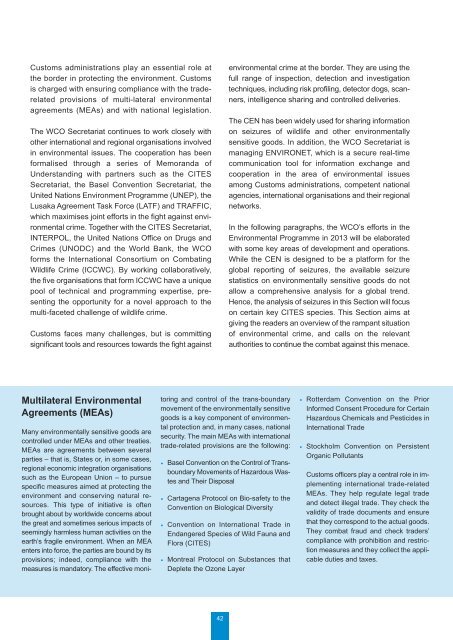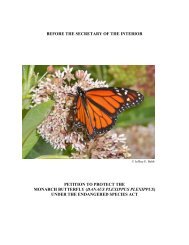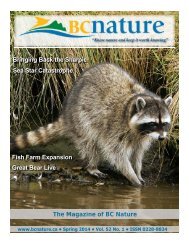Create successful ePaper yourself
Turn your PDF publications into a flip-book with our unique Google optimized e-Paper software.
Customs administrations play an essential role at<br />
the border in protecting the environment. Customs<br />
is charged with ensuring compliance with the <strong>trade</strong>related<br />
provisions of multi-lateral environmental<br />
agreements (MEAs) and with national legislation.<br />
The WCO Secretariat continues to work closely with<br />
other international and regional organisations involved<br />
in environmental issues. The cooperation has been<br />
formalised through a series of Memoranda of<br />
Understanding with partners such as the CITES<br />
Secretariat, the Basel Convention Secretariat, the<br />
United Nations Environment Programme (UNEP), the<br />
Lusaka Agreement Task Force (LATF) and TRAFFIC,<br />
which maximises joint efforts in the fight against environmental<br />
crime. Together with the CITES Secretariat,<br />
INTERPOL, the United Nations Office on Drugs and<br />
Crimes (UNODC) and the World Bank, the WCO<br />
forms the International Consortium on Combating<br />
Wildlife Crime (ICCWC). By working collaboratively,<br />
the five organisations that form ICCWC have a unique<br />
pool of technical and programming expertise, presenting<br />
the opportunity for a novel approach to the<br />
multi-faceted challenge of wildlife crime.<br />
Customs faces many challenges, but is committing<br />
significant tools and resources towards the fight against<br />
environmental crime at the border. They are using the<br />
full range of inspection, detection and investigation<br />
techniques, including risk profiling, detector dogs, scanners,<br />
intelligence sharing and controlled deliveries.<br />
The CEN has been widely used for sharing information<br />
on seizures of wildlife and other environmentally<br />
sensitive goods. In addition, the WCO Secretariat is<br />
managing ENVIRONET, which is a secure real-time<br />
communication tool for information exchange and<br />
cooperation in the area of environmental issues<br />
among Customs administrations, competent national<br />
agencies, international organisations and their regional<br />
networks.<br />
In the following paragraphs, the WCO’s efforts in the<br />
Environmental Programme in <strong>2013</strong> will be elaborated<br />
with some key areas of development and operations.<br />
While the CEN is designed to be a platform for the<br />
global reporting of seizures, the available seizure<br />
statistics on environmentally sensitive goods do not<br />
allow a comprehensive analysis for a global trend.<br />
Hence, the analysis of seizures in this Section will focus<br />
on certain key CITES species. This Section aims at<br />
giving the readers an overview of the rampant situation<br />
of environmental crime, and calls on the relevant<br />
authorities to continue the combat against this menace.<br />
Multilateral Environmental<br />
Agreements (MEAs)<br />
Many environmentally sensitive goods are<br />
controlled under MEAs and other treaties.<br />
MEAs are agreements between several<br />
parties – that is, States or, in some cases,<br />
regional economic integration organisations<br />
such as the European Union – to pursue<br />
specific measures aimed at protecting the<br />
environment and conserving natural resources.<br />
This type of initiative is often<br />
brought about by worldwide concerns about<br />
the great and sometimes serious impacts of<br />
seemingly harmless human activities on the<br />
earth’s fragile environment. When an MEA<br />
enters into force, the parties are bound by its<br />
provisions; indeed, compliance with the<br />
measures is mandatory. The effective monitoring<br />
and control of the trans-boundary<br />
movement of the environmentally sensitive<br />
goods is a key component of environmental<br />
protection and, in many cases, national<br />
security. The main MEAs with international<br />
<strong>trade</strong>-related provisions are the following:<br />
• Basel Convention on the Control of Transboundary<br />
Movements of Hazardous Wastes<br />
and Their Disposal<br />
• Cartagena Protocol on Bio-safety to the<br />
Convention on Biological Diversity<br />
• Convention on International Trade in<br />
Endangered Species of Wild Fauna and<br />
Flora (CITES)<br />
• Montreal Protocol on Substances that<br />
Deplete the Ozone Layer<br />
• Rotterdam Convention on the Prior<br />
Informed Consent Procedure for Certain<br />
Hazardous Chemicals and Pesticides in<br />
International Trade<br />
• Stockholm Convention on Persistent<br />
Organic Pollutants<br />
Customs officers play a central role in implementing<br />
international <strong>trade</strong>-related<br />
MEAs. They help regulate legal <strong>trade</strong><br />
and detect illegal <strong>trade</strong>. They check the<br />
validity of <strong>trade</strong> documents and ensure<br />
that they correspond to the actual goods.<br />
They combat fraud and check <strong>trade</strong>rs’<br />
compliance with prohibition and restriction<br />
measures and they collect the applicable<br />
duties and taxes.<br />
42




